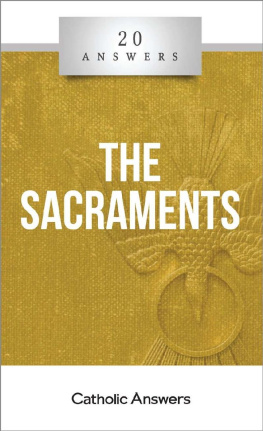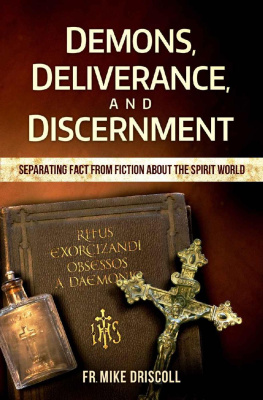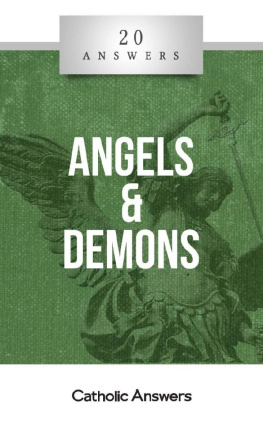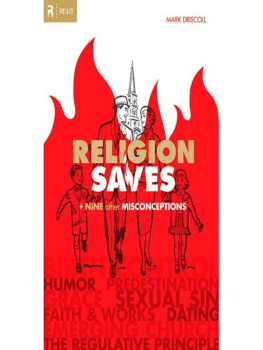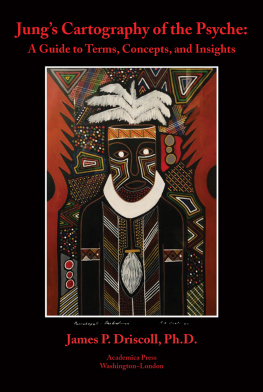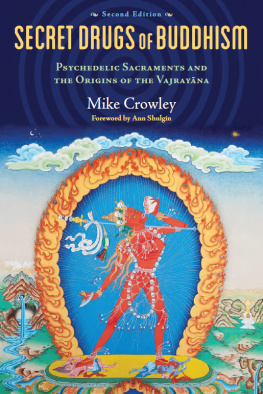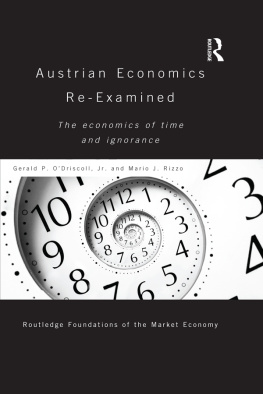Fr. Mike Driscoll - 20 Answers - The Sacraments
Here you can read online Fr. Mike Driscoll - 20 Answers - The Sacraments full text of the book (entire story) in english for free. Download pdf and epub, get meaning, cover and reviews about this ebook. year: 2016, publisher: Catholic Answers Press, genre: Religion. Description of the work, (preface) as well as reviews are available. Best literature library LitArk.com created for fans of good reading and offers a wide selection of genres:
Romance novel
Science fiction
Adventure
Detective
Science
History
Home and family
Prose
Art
Politics
Computer
Non-fiction
Religion
Business
Children
Humor
Choose a favorite category and find really read worthwhile books. Enjoy immersion in the world of imagination, feel the emotions of the characters or learn something new for yourself, make an fascinating discovery.
- Book:20 Answers - The Sacraments
- Author:
- Publisher:Catholic Answers Press
- Genre:
- Year:2016
- Rating:5 / 5
- Favourites:Add to favourites
- Your mark:
- 100
- 1
- 2
- 3
- 4
- 5
20 Answers - The Sacraments: summary, description and annotation
We offer to read an annotation, description, summary or preface (depends on what the author of the book "20 Answers - The Sacraments" wrote himself). If you haven't found the necessary information about the book — write in the comments, we will try to find it.
20 Answers - The Sacraments — read online for free the complete book (whole text) full work
Below is the text of the book, divided by pages. System saving the place of the last page read, allows you to conveniently read the book "20 Answers - The Sacraments" online for free, without having to search again every time where you left off. Put a bookmark, and you can go to the page where you finished reading at any time.
Font size:
Interval:
Bookmark:
Table of Contents
20 Answers
~
The Sacraments
Fr. Mike Driscoll

20 Answers: The Sacraments
Fr. Mike Driscoll
2016 Catholic Answers
All rights reserved. Except for quotations, no part of this book may be reproduced or transmitted in any form or by any means, electronic or mechanical, including photocopying, recording, uploading to the Internet, or by any information storage and retrieval system, without written permission from the publisher.
Published by Catholic Answers, Inc.
2020 Gillespie Way
El Cajon, California 92020
1-888-291-8000 orders
619-387-0042 fax
catholic.com
Printed in the United States of America
978-1-68357-017-2
978-1-68357-018-9 Kindle
978-1-68357-019-6 ePub
Introduction
A sacrament is an outward sign instituted by Christ to give grace .This line appeared in the 1885 Baltimore Catechism and was the standard definition memorized by Catholic children for the next eighty years. It is still taught by many Catholic parents, school teachers, and adult education instructors. The fact that it was memorized does not mean it was left unexplained; the Baltimore Catechism had many further questions and answers describing how the outward signs are performed, where in Scripture Christ is seen to institute them, and what is meant by grace.
Christ is the Word made flesh, God the Son who came into the world in a physical body. Though he also ascended into heaven in his resurrected body, he is still present in physical form in the sacraments. These strongest channels of Gods grace enable the faithful to love God and neighbor as Jesus commanded. By keeping the sacraments at the center of our lives, we can know, love, and serve God in this world and one day be happy with him forever in heaven.
1. What is a sacrament?
As the Compendium of the Catechism of the Catholic Church puts it, sacraments are efficacious signs of grace perceptible to the senses. They were instituted by Christ and entrusted to the Church, and through them divine life is bestowed on us ( Compendium 224).
The sacraments are perceptible to the senses , meaning they have an external aspect that can be seen, heard, touched, tasted, or smelled. As efficacious signs of grace , they really confer the grace they signify. A red light is a sign telling drivers to stop their cars, but it does not cause cars to stop; the drivers themselves must do that. Sacraments are signs that Gods grace is being given, but they also give the grace of which they are signs.
The sacraments were instituted by Christ and entrusted to the Church. Although some are described in more detail than others, references to all of the sacraments can be found in the New Testament. Jesus entrusted the sacraments to the Church to preserve and administer them as well as to safeguard them. The Church does not have the authority to add more sacraments, abolish any of those that exist, or change the essence of the seven that Jesus instituted. In recent years we have seen examples of these limitations. The Church has stated that it does not have the authority to ordain women to the priesthood; that two men or two women going through a ceremony mimicking marriage does not constitute the sacrament of matrimony; and that priests do not have the ability to change rice cakes into the body of Christ.
2. How do sacraments work?
Sacraments can be studied in a way common to classical philosophy, which is to look at the four causes : material, formal, efficient, and final. For example, if an artist makes a statue, the material cause is the block of marble he used, the formal cause is the shape of the statue, the efficient cause is the artist, and the final cause is the purpose he had in mind for the statue.
In regard to the sacraments, the final cause , or purpose for which Jesus instituted them, is to give grace. There are two types of grace given in the sacraments: sanctifying grace and sacramental grace. Sanctifying grace is a gift from God that gives human beings a share in his life: it is Gods life in the soul ( Compendium 423). This grace is the same in all of the sacraments. Sacramental grace is a gift from God that is proper to the sacrament in which it is given; each sacrament gives us a different gift from God ( Compendium 424).
In the sacraments, the material cause , or matter , is the aspect that is perceptible to the senses: for example, the water in baptism, and the bread and wine in the Eucharist. The Church has authority over the matter of each sacrament, but it cannot extend the matter in ways that Jesus limited it, not only in Scripture but through Sacred Tradition. For example, though the Bible does not explicitly state that the sacrament of confirmation requires anointing with oil, that has been part of Church Tradition since the beginning, and it cannot be changed to an anointing with water.
The formal cause , or form of a sacrament, is the spoken words that cause the grace to be conferred. Because Jesus did not explicitly state the words to be used for all of the sacraments, in those cases the Church has the authority to determine what those words are. Furthermore, Jesus spoke Hebrew and Aramaic, but from the beginning of the Church different languages were used for the sacraments, and in order for them to be handed down through time and place, the Church authorizes the words to be used in different languages.
The efficient cause of a sacrament is the minister who brings together the matter and form, causing the sacrament to take place and Gods grace to be given. For example, in baptism he pours the water and says the words, and the sacrament takes place; original sin is wiped away and Gods grace is given to the person receiving it. As with matter and form, based on how Jesus and the apostles instituted and passed on each sacrament, the Church determines who is capable of being a minister to confer it. Some sacraments have an ordinary minister (for ordinary circumstances) and an extraordinary minister (for extraordinary circumstances).
3. Why do we have sacraments?
At first it may seem like sacraments are unnecessary. If Gods grace justifies or saves people, then why do Christians need to receive more grace through sacraments? If his grace is purely a gift, then how can we do something, like receiving sacraments, to get this gift?
Sacraments are not means of earning Gods grace; his grace is a gift, and sacraments do not make us deserving of it. Rather, sacraments are part of our covenant with Jesus: he promised that if we do certain things, he will give us the gift of his grace, and thereby the gift of salvation. For example, Jesus taught that the gift of his grace is given through baptism: Truly, truly, I say to you, unless one is born of water and the Spirit, he cannot enter the kingdom of God (John 3:5). Similarly, people become his disciples through baptism: Go therefore and make disciples of all nations, baptizing them in the name of the Father and of the Son and of the Holy Spirit (Matt. 28:19). Jesus told his disciples to make disciples by baptizing and that he would give the Holy Spirit to those who are baptized. It is through this sacrament that people first receive his life, his grace.
The reason there are additional sacraments is to increase this gift of grace, or to restore it when it is lost completely. Some Christians dispute that grace can be lost, believing that once were saved, were always saved. This contradicts what Jesus said: that after accepting him as Lord and Savior, people can still reject him through their sins. Awake, and strengthen what remains and is on the point of death, for I have not found your works perfect in the sight of my God. Remember then what you received and heard; keep that, and repent (Rev. 3:23; cf. Matt. 7:2123; 1 Cor. 4:35; 1 John 1:810; Rev. 2:13:22).
Next pageFont size:
Interval:
Bookmark:
Similar books «20 Answers - The Sacraments»
Look at similar books to 20 Answers - The Sacraments. We have selected literature similar in name and meaning in the hope of providing readers with more options to find new, interesting, not yet read works.
Discussion, reviews of the book 20 Answers - The Sacraments and just readers' own opinions. Leave your comments, write what you think about the work, its meaning or the main characters. Specify what exactly you liked and what you didn't like, and why you think so.

